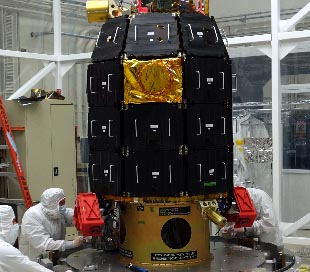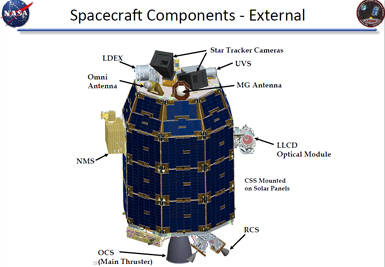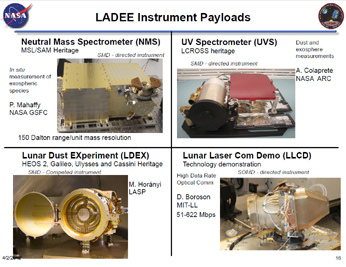Difference between revisions of "LADEE"
| (One intermediate revision by the same user not shown) | |||
| Line 5: | Line 5: | ||
{| class="wiki_table" | {| class="wiki_table" | ||
| | | | ||
| − | [[Image: | + | [[Image:Ladee-spacecraft.jpg|ladee-spacecraft.jpg]]<br /> |
| | | | ||
[[Image:Ladee-Bus.jpg|Ladee-Bus.jpg]]<br /> | [[Image:Ladee-Bus.jpg|Ladee-Bus.jpg]]<br /> | ||
| Line 11: | Line 11: | ||
Credit: NASA Ames, NASA.<br /> <br /> | Credit: NASA Ames, NASA.<br /> <br /> | ||
==Description== | ==Description== | ||
| − | [http://www.nasa.gov/mission_pages/ladee/main/index.html LADEE] will orbit the Moon for approximately 100 days. Its main objectives are to study the lunar atmosphere and its exospheric dust environment; gaining information about the atmosphere’s composition, its density and variation globally. Three science instruments onboard (UV-Visible and Neutral Mass spectrometers, and a dust instrument) will be used to obtain the above data; essentially giving scientists a look at the current state of the lunar atmosphere, before future lunar missions return.<br /> <br /> Also included onboard LADEE is a high performance, space-based communications system known as [http://esc.gsfc.nasa.gov/267/271.html LLCD] (Lunar Laser Communication Demonstration). Operated by NASA, LLCD will test the capability of sending and receiving data as pulses of light at very high rates. The data are directed at Earth-based, ground stations operated by the [http://www.esa.int/ESA European Space Agency], which will then redirect the data back up to LADEE again. If the laser communication tests test positive between LADEE and the ground stations, it could lead to the standardisation for a new framework of high-rate, long-distance communication in space.<br /> <br /> LADEE was designed, developed, built and tested by [http://www.nasa.gov/centers/ames/home/index.html NASA Ames Research Center]. After the spacecraft reaches the Moon, it will then prepare its science package and systems for eventual operation, and orbit: configuration of which will be near-circular retrograde (clockwise) equatorial, with a period of 113 minutes at some 50 km above the surface. Given a 28-day [http://www.nasa.gov/ames/nasa-extends-moon-exploring-satellite-mission/ extension] period to its mission in late January 2014, LADEE impacted the lunar surface on the 17 April 2014, where further data may be gleaned from the impact.<span class="membersnap">- | + | [http://www.nasa.gov/mission_pages/ladee/main/index.html LADEE] will orbit the Moon for approximately 100 days. Its main objectives are to study the lunar atmosphere and its exospheric dust environment; gaining information about the atmosphere’s composition, its density and variation globally. Three science instruments onboard (UV-Visible and Neutral Mass spectrometers, and a dust instrument) will be used to obtain the above data; essentially giving scientists a look at the current state of the lunar atmosphere, before future lunar missions return.<br /> <br /> Also included onboard LADEE is a high performance, space-based communications system known as [http://esc.gsfc.nasa.gov/267/271.html LLCD] (Lunar Laser Communication Demonstration). Operated by NASA, LLCD will test the capability of sending and receiving data as pulses of light at very high rates. The data are directed at Earth-based, ground stations operated by the [http://www.esa.int/ESA European Space Agency], which will then redirect the data back up to LADEE again. If the laser communication tests test positive between LADEE and the ground stations, it could lead to the standardisation for a new framework of high-rate, long-distance communication in space.<br /> <br /> LADEE was designed, developed, built and tested by [http://www.nasa.gov/centers/ames/home/index.html NASA Ames Research Center]. After the spacecraft reaches the Moon, it will then prepare its science package and systems for eventual operation, and orbit: configuration of which will be near-circular retrograde (clockwise) equatorial, with a period of 113 minutes at some 50 km above the surface. Given a 28-day [http://www.nasa.gov/ames/nasa-extends-moon-exploring-satellite-mission/ extension] period to its mission in late January 2014, LADEE impacted the lunar surface on the 17 April 2014, where further data may be gleaned from the impact.<span class="membersnap">- JohnMoore2</span><br /> <br /> |
==Additional Information== | ==Additional Information== | ||
* Launched on the 6 September 2013 from the [http://www.nasa.gov/centers/wallops/home/index.html#.UehAc1NQ0xY Wallops Flight Facility]. | * Launched on the 6 September 2013 from the [http://www.nasa.gov/centers/wallops/home/index.html#.UehAc1NQ0xY Wallops Flight Facility]. | ||
Latest revision as of 21:20, 16 April 2018
Contents
[hide]LADEE (Lunar Atmosphere and Dust Environment Explorer)
Credit: NASA Ames, NASA.
Description
LADEE will orbit the Moon for approximately 100 days. Its main objectives are to study the lunar atmosphere and its exospheric dust environment; gaining information about the atmosphere’s composition, its density and variation globally. Three science instruments onboard (UV-Visible and Neutral Mass spectrometers, and a dust instrument) will be used to obtain the above data; essentially giving scientists a look at the current state of the lunar atmosphere, before future lunar missions return.
Also included onboard LADEE is a high performance, space-based communications system known as LLCD (Lunar Laser Communication Demonstration). Operated by NASA, LLCD will test the capability of sending and receiving data as pulses of light at very high rates. The data are directed at Earth-based, ground stations operated by the European Space Agency, which will then redirect the data back up to LADEE again. If the laser communication tests test positive between LADEE and the ground stations, it could lead to the standardisation for a new framework of high-rate, long-distance communication in space.
LADEE was designed, developed, built and tested by NASA Ames Research Center. After the spacecraft reaches the Moon, it will then prepare its science package and systems for eventual operation, and orbit: configuration of which will be near-circular retrograde (clockwise) equatorial, with a period of 113 minutes at some 50 km above the surface. Given a 28-day extension period to its mission in late January 2014, LADEE impacted the lunar surface on the 17 April 2014, where further data may be gleaned from the impact.- JohnMoore2
Additional Information
- Launched on the 6 September 2013 from the Wallops Flight Facility.
- Richard Elphic – Project Scientist for the LADEE mission.
- Gregory Delory – Deputy Project Scientist for the LADEE mission.
- Instruments (Credit NASA - click for larger view):
LROC Articles
LPOD Articles
All You Need To Know (about LADEE)
Ships passing in the daytime (LADEE photographed by LRO)
Bibliography
- Bhattacharjee, Y. (2013). Novel Craft Sets Out to Probe the Mysteries of Moondust – Science : Vol. 341 no. 6151 p. 1161, DOI: 10.1126/science.341.6151.1161.13 September 2013.
- Delory, G. T. and Hine, B (2013). LADEE mission overview (Pdf ~ 13 Mb) – LCPM 10, Pasadena, CA, June 18, 2013.
- Delory, G. T. et al (2010). The LADEE Mission: The next step after the discovery of water on the Moon (Pdf – small Mb) – 41st Lunar and Planetary Science Conference (2010)


